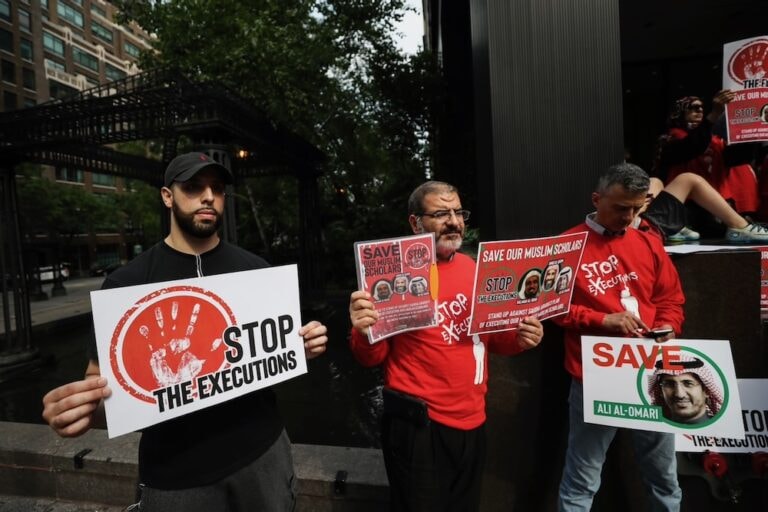(WiPC/IFEX) – The following is a Writers in Prison Committee press release: INTERNATIONAL WOMEN’S DAY 8 MARCH 2004 SAUDI ARABIA: Wajeha Al-Huwaider ‘We live in troubled times. The current situation and the challenges and dilemmas facing the country require a considered vision of the future and reform. The men and women of this country must […]
(WiPC/IFEX) – The following is a Writers in Prison Committee press release:
INTERNATIONAL WOMEN’S DAY 8 MARCH 2004
SAUDI ARABIA: Wajeha Al-Huwaider
‘We live in troubled times. The current situation and the challenges and dilemmas facing the country require a considered vision of the future and reform. The men and women of this country must stand shoulder to shoulder to ensure that Saudi Arabia remains a land of peace and security for all of its people. However, this will not happen while more than half the population remains second-class citizens’. Wajeha Al-Huwaider, ‘Women Still Find Themselves Marginalized in Our Society’, published in Arab News on 9 May 2003.
To mark International Women’s Day on 8 March, International PEN Writers in Prison Committee is focussing on the case of leading Saudi Arabian journalist Wajeha Al-Huwaider. Al-Huwaider, who writes for the Arabic-language daily Al-Watan and the English-language daily Arab News, has been banned from publishing since August 2003. The directive against her was reportedly issued by the Ministry of Information in response to a column published in late May 2003 in which she suggested that there was disillusionment among Saudi citizens and pointed to a growing tendency for people to look to the United States for solutions to their problems. She is among a growing number of liberal and opposition journalists who have been banned from publishing and subjected to government harassment in recent months. (For more information see the Committee to Protect Journalists website (www.cpj.org) and IFEX (ifex.org).
The need for, as Wajeha has described it, a ‘considered vision of the future and reform’, has become a pressing one for many in Saudi Arabia. In the wake of the September 11 terrorist attacks on the United States, in which 15 of the 19 hijackers were Saudis, the conflicting forces of spiralling radicalism within the country and increased pressure from the United States are threatening the country’s stability. In May and November last year, suicide bombers targeted the capital, Riyadh. Political instability is being further compounded by the kingdom’s first serious economic downturn since 1932. The Saudi political system, which is an alliance between the ruling Al-Saud royal family and a deeply conservative religious establishment based on the rigid Wahhabi branch of Sunni Islam, is being forced to address these issues and is slowly opening itself to change. Following the Riyadh bombing in May 2003, the authorities announced plans to hold elections in 2004 at council level for the first time. However, many reformist and dissident voices want to see speedier and more radical change than is being offered by the government, and as calls for wide-reaching political, social and economic reform have been growing, so have the numbers of journalists who have been dismissed from their posts or banned from publishing.
Wajeha Al-Huwaider writes broadly on political, social and cultural issues in the Arab world, including the marginalisation of women, the plight of the Shiite minority, and relations with the West. She has written a book which she is unable to publish, and has started on a second. She has two sons and lives in Dhahran, Eastern Province, Saudi Arabia. Many of her articles are available online at http://www.arabnews.com
International PEN Writers in Prison Committee protests the banning order issued against Saudi journalist and writer Wajeha Al-Huwaider solely for the peaceful and legitimate exercise of her profession, and calls for Wajeha Al-Huwaider and all other journalists in Saudi Arabia to be allowed to practise their professions in accordance with Article 19 of the United Nations Universal Declaration of Human Rights.


